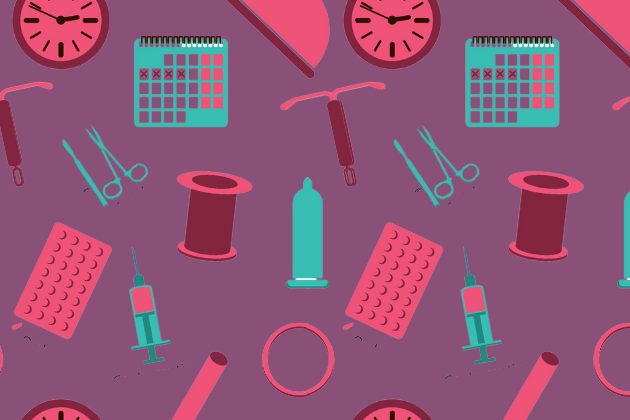
Emergency contraception offers a back-up plan to prevent pregnancy after unprotected sex or after a birth control method fails. There are 3 different options that are typically available for emergency contraception: 2 types of emergency contraceptive pill (ECP), and the copper IUD.
Progestin ECP (Plan B, Contingency One, Option 2, Next Choice, NorLevo)
Progestin ECP is effective for up to 120 hours (5 days) after sperm gets into the vagina* of a person who can get pregnant and is most effective the sooner you take it.
It contains one hormone (progestin), which prevents or delays the ovaries from releasing an egg (ovulation).
You can buy it over the counter at pharmacies, meaning you don’t need a prescription to use it. At the pharmacy, it may be out on a shelf or you may have to ask a pharmacist to get it for you. You can also often get progestin ECP from sexual health clinics.
Things to consider
- You do not need a prescription to use it.
- You can buy it for someone else to use.
- It is available at most pharmacies and may be available for free or at low cost at sexual health clinics
- It is less effective than other methods of emergency contraception, especially if it has been more than 72 hours (3 days) since sperm got into your body.
- It may be less effective if you weigh more than 165 pounds and ineffective if you weigh more than 176 pounds.
- You may have side effects.
- It does not interfere with other hormonal birth control. You don’t need to wait to start or resume another hormonal method after taking it.
- It does not reduce the chance of getting or passing STIs.
What to expect after taking ECP
You may have vaginal bleeding or spotting within the few weeks after taking ECP.
Your next period may come a little early or a little late and may be heavier or lighter than usual. If you have not started a period that seems normal for you within 3 weeks after taking ECP, consider doing a pregnancy test.
Using ECP repeatedly
Taking ECP repeatedly:
- Doesn’t make ECP less effective the next time you take it.
- Doesn’t harm your health.
- Won’t make it harder for you to get pregnant in future.
ECP is effective at reducing the chance you’ll get pregnant once sperm has entered your body but it is not as effective at preventing pregnancy as using another birth control method in advance.
Ulipristal Acetate ECP (Ella)
Ulipristal Acetate ECP (Ella) is effective for up to 120 hours (5 days) after sperm gets into the vagina* of a person who can get pregnant, and is most effective the sooner you take it. It is more effective than progestin ECP, especially if it has been more than 72 hours (3 days) since the incident you are concerned about.
It blocks the action of progestin, which prevents or delays the ovaries from releasing an egg (ovulation), and it may make it more difficult for the sperm and egg to meet in the fallopian tubes.
Things to consider
- It is more effective than progestin ECP, especially if it has been more than 72 hours (3 days) since sperm got into your body.
- You need a prescription to use it,, and can pick it up at a pharmacy or some sexual health clinics.
- It may be less effective if you weigh more than 195 pounds.
- You may have side effects.
- It can interfere with other hormonal birth control. You may need to wait a few days after taking it to start or resume another hormonal method.
- It does not reduce the chance of getting or passing STIs.
What to expect after taking ECP
You may have vaginal bleeding or spotting within the few weeks after taking ECP.
Your next period may come a little early or a little late and may be heavier or lighter than usual. If you have not started a period that seems normal for you within 3 weeks after taking ECP, consider doing a pregnancy test.
Using ECP repeatedly
Taking ECP repeatedly:
- Doesn’t make ECP less effective the next time you take it.
- Doesn’t harm your health.
- Won’t make it harder for you to get pregnant in future.
ECP is effective at reducing the chance you’ll get pregnant once sperm has entered your body but it is not as effective at preventing pregnancy as using another birth control method in advance.
The Copper IUD
The copper IUD is the most effective form of emergency contraception. It is 98% effective at preventing pregnancy if inserted up to 7 days after sperm has gotten into the vagina of a person who can get pregnant. You can have it removed after your next period once you are sure you didn’t get pregnant, or leave it in as ongoing birth control for several years.
Things to consider
- It is more effective than ECPs, especially if it has been longer since sperm got into your body.
- You can use it as ongoing birth control for several years if you want.
- You need a prescription to use it and a health care provider needs to insert it. It can be difficult to find a provider to insert it quickly enough to be effective.
- The insertion process is more invasive than taking a pill and is usually painful.
- It does not reduce the chance of getting or passing STIs.
* Not everyone uses these words for their body parts or relates to them in the same way. We have used these words as they are commonly known and encourage you to use the language that feels best for you.
